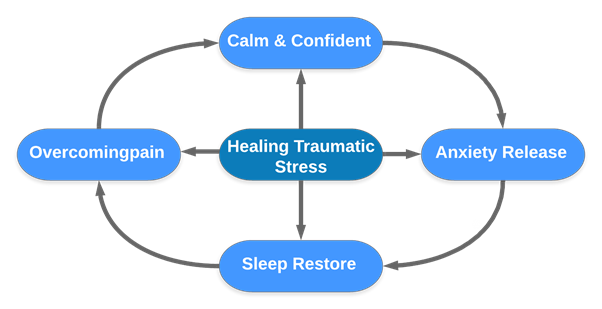Healing Traumatic Stress
It is now well known that traumatic stress has long-term damaging effects on physical and mental health. These effects typically surface as problems such as anxiety, depression, insomnia, pain and poor self-esteem, often in combination with each other. These kinds of problems are the unavoidable legacy of childhood adversity – which can mean anything from a single incidence of child sexual abuse to years of chronic physical and mental abuse and neglect. Because of denial, dissociation and shame it may be years before the survivor becomes conscious of the full effects of what they have endured. Many trauma survivors may not even see themselves as such – trauma colours the way they see themselves in the world so much it becomes invisible. But physical or sexual abuse, emotional neglect and objectification and are not normal, not the fault of the victim and not without consequences for the individual, not matter how hard they try. As Babette Rothschild famously wrote “the mind forgets, but the body remembers.”
Your healing journey starts with feeling too affected by one or other of the physical or mental effects of trauma (eg. anxiety, insomnia, pain, insecurity). This may have stimulated you to seek professional help, read a self-help book or download an app. The advantage of the latter is that it enables content to be delivered in a much more dynamic multi-sensorial way than a book. The Healing Traumatic stress series is a collection of apps I designed to overcome the most common effects of traumatic stress.

Anxiety Release is designed to help tame excessive anxiety, one of the most common effect of traumatic stress. Anxiety is part of your survival response and fundamentally adaptive. But if it occurs too readily and too intensely, anxiety can become a source of helplessness and shame. Anxiety release comprises 10 sessions incorporating audio and visual stimuli designed to de-activate the fight-flight response. A unique feature of the app is a brain animation + BLS which mimics the transition the human brain makes when it’s activity levels transition from alert to relaxed. Another popular session takes you through a process for connecting with your vulnerable emotional self/inner child. The feeling of security that comes from having a connection with your emotional self is actually the most powerful antidote to anxiety.
Calm and Confident is designed to help overcome the physical tension and impaired sense of self that frequently result from childhood trauma. It does this through 10 sessions designed to appeal to visual, auditory and mental aspects of experience to reverse the learned tension and insecurity that trauma survivors typically experience. The combination of these elements, paired with bilateral stimulation (BLS), a treatment element of EMDR, stimulates relaxation and increased access to positive mental resources. The aim is to help you feel both Calm and Confident naturally. Confidence should come naturally – it is the end-product of feeling calm. Feeling confident means experiencing yourself as connected, self-aware, accepting, balanced, energized, whole, and capable.
Sleeping problems and fatigue are one of the most common effects of traumatic stress. Sleep Restore is designed to help reduce the tension and mental activity that keeps you awake at night. Sleep Restore consists of over 25 guided meditations incorporating visual auditory and mental stimulation designed to reduce the tension that inhibits sleep and facilitate more natural wake-rest cycle. Many of the tracks are quite hypnotic in nature. Others incorporate nature sounds, music and white noise. There is something for everybody. As with my other apps a central feature is the incorporation of BLS to help stimulate decreased tension and increased access to mental and emotional resources.
Overcomingpain is designed to help manage pain, including physical discomfort, fatigue, numbness and concentration and memory problems. Pain and just not feeling right physically is another common effect of traumatic stress. Reflecting the multi-sensorial nature of pain, the 25 sessions on this app are divided into three playlists targeting mental, sensory and stress-related aspects of this problem. One of the most powerful resources are the brain training sessions which incorporate fMRI imagery, BLS, guided attention and subliminal suggestions to reprogram the brain activity which maintains your pain. Other sessions rely on a combination of imagery and focused attention to transform your pain in the here and now. As with my other apps a central feature is the incorporation of BLS to help stimulate access to mental and emotional resources.
Whether used individually or in rotation, this series of apps constitutes a practical and cohesive set of resources for overcoming the most common physical and emotional effects of traumatic stress. These apps can be used as stand-alone resources or as an adjunct to psychotherapy. While individual results may vary, the principles of Neuroplasticity indicate that with time and practice, most users can expect to experience some reduction in the severity and prominence of their symptoms and increased well-being and capacity for joy.
Amano T, Toichi M (2016) The Role of Alternating Bilateral Stimulation in Establishing Positive Cognition in EMDR Therapy: A Multi-Channel Near-Infrared Spectroscopy Study. PLoS ONE 11(10): e0162735. doi:10.1371/journal.pone.0162735